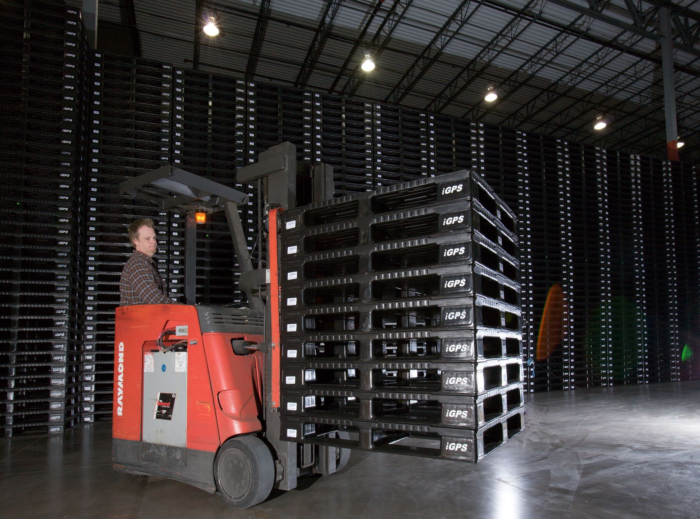Pallets are a vital part of the modern supply chain, but they are also bulky, heavy, and a headache to manage. Empty pallets take up a great deal of space in warehouses that could be better used to store products. Outside of the warehouse, pallets often form obstructions for vehicles trying to maneuver to and from loading docks as they are stacked and set aside on busy days.
Getting rid of pallets can be difficult, too. It might mean participating in a pallet exchange and accepting substandard pallets. As resellers are often only interested in purchasing the best pallets, selling used platforms can leave you with only the pallets in the worst condition. Having these pallets hauled away for disposal requires contracting transportation for the load and paying dump fees. Fortunately, a pallet management program does away with these hassles and the logistical headaches that go with them.
What Is a Pallet Management Program?
At first glance, a pallet management program might seem similar to a pallet exchange. Pallet exchanges are agreements in which a driver receives empty pallets to replace those offloaded. Pallet exchanges don’t offer either party much control over the quality of the pallets they receive. A transporter might drop off a load of products on high-quality grade A GMA pallets and be given lower-grade pallets in return. Some companies refuse to participate in pallet exchanges for this reason.
A pallet management company arranges the delivery of empty pallets to the manufacturer or warehouse facility and also their retrieval and transportation to other nearby clients.
A pallet management program differs significantly from a pallet exchange in that the pallets are owned by a third-party company and rented as needed. The pallet management company arranges the delivery of empty pallets to the manufacturer or warehouse facility and also their retrieval and transportation to other nearby clients once they reach the end of the supply chain. This frees the customer from worries about purchasing, storing, and maintaining pallets and enables them to focus on core business products and processes that provide revenue. Pallet management programs like these are commonly called pallet pooling programs, as the customer rents pallets from a common pool shared by customers of the program.
Advantages of a Pallet Pooling Program
 Pallet pooling provides a cost-effective pallet management strategy for many companies. Perhaps one of the biggest benefits is that it offers customers pallets on demand, eliminating the need to store quantities of idle pallets until they are needed during a peak season. However, the benefits of pallet pooling do not end there. A pallet rental company will manage every aspect of maintaining their customers’ pallet inventory. As a result, pallet pooling customers no longer need to:
Pallet pooling provides a cost-effective pallet management strategy for many companies. Perhaps one of the biggest benefits is that it offers customers pallets on demand, eliminating the need to store quantities of idle pallets until they are needed during a peak season. However, the benefits of pallet pooling do not end there. A pallet rental company will manage every aspect of maintaining their customers’ pallet inventory. As a result, pallet pooling customers no longer need to:
-
- Procure Pallets: Pallets wear out over time, and maintaining an inventory means constantly acquiring new pallets to replace those that have worn out. This is an ongoing cost and one which also involves a great deal of time and effort. Finding a reliable source for quality pallets at a stable price is a major logistical hassle, and, in some cases, simply not possible.
- Recondition Pallets: Wood pallets that have degraded can be reconditioned. For instance, pallets with split or missing deck or stringer boards can be repaired. Plates can be used to repair splits, and missing boards can be replaced. Without a pallet management company, the on-premise repair or transportation of pallets to a location where they can be repaired must be managed in-house.
- Dispose of Pallets: Even with repairs, wood pallets still wear down quickly and will eventually come to the point where they can no longer be used. When this happens, the pallets must be disposed of, which involves logistical considerations as well as transportation and disposal costs.
The net effect of placing these responsibilities in the hands of a pallet management program is to reduce the time and labor a company spends managing pallets, which ultimately results in a lower Total Cost of Business (TCOB). A pallet rental company also manages pallet transportation once the pallets have reached the retailer, which helps avoid deadhead trucking in which loads of nothing but empty pallets are shipped. However, not all pallet management programs are created equally.The Benefits of Plastic Pallets for Pooling
 Because of the many benefits mentioned above, pallet pooling has become a standard method of pallet management for nationwide retailers and their vendors. However, most major pallet pooling programs deal in heavy wood block pallets, rather than the more common stringer pallet. While block pallets are more durable than stringer pallets, they do suffer similar issues, such as cracks, warping, splintering, and loose fasteners, and require repair in order to remain in service after a few uses. Because it is in a pallet management program’s interests to keep their pallets in service as long as possible between repairs, many wood pallet pools contain pallets that should have been pulled from service or disposed of long ago.
Because of the many benefits mentioned above, pallet pooling has become a standard method of pallet management for nationwide retailers and their vendors. However, most major pallet pooling programs deal in heavy wood block pallets, rather than the more common stringer pallet. While block pallets are more durable than stringer pallets, they do suffer similar issues, such as cracks, warping, splintering, and loose fasteners, and require repair in order to remain in service after a few uses. Because it is in a pallet management program’s interests to keep their pallets in service as long as possible between repairs, many wood pallet pools contain pallets that should have been pulled from service or disposed of long ago.Plastic pallets are far more durable than wood ones but also 35 percent lighter, with a much longer expected lifespan in the supply chain.
To some extent, this is unavoidable. Wood is an inconsistent material and not every board has the same lifespan, meaning that a few cases of accidental damage are unavoidable. One solution to this issue is to use a longer-lasting pallet material. Plastic pallets are far more durable than wood ones but also 35 percent lighter, with a much longer expected lifespan in the supply chain (high-quality plastic pallets can make 100 trips through the supply chain in a lifetime, while wood block pallets will make 20 trips at most). Using a pallet management program that specializes in plastic pallets reduces the time and overhead costs of pallet management while providing safer, stronger, lighter and more hygienic rental pallets.
The iGPS pallet management program rents lightweight, durable, GMA-spec plastic pallets. Reduce the cost and inefficiency of your company’s pallet management by calling 1-800-884-0225, emailing a specialist at switch@igps.net, or visiting our contact page.



